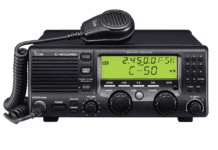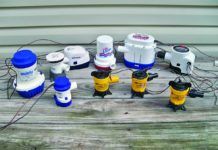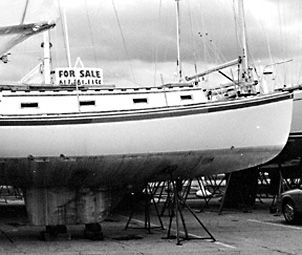Most boats, especially those longer than 35 feet, are sold through yacht brokers. Therefore, dealing with a member of this profession is a strong likelihood, whether you plan on being a buyer or a seller.
Before we dive into the shenanigans you may encounter in the world of yacht brokering, it’s important to review the traditional elements of buying or selling a boat and the role of the broker.
The broker’s role probably begins long before you’re ready to seal a deal for a yacht. If you are a seller, you probably contacted the broker and listed your boat. When you list a boat, you usually sign a contract, too, promising the broker a commission of at most 10% if he is successful. Commissions vary from region to region and many sellers attempt to structure the commission to achieve particular goals. For example, if a broker sells the yacht sooner rather than later, he gets a larger commission.
If you’re a buyer, your first contact with a broker is probably when you contact one to show you boats for sale that conform with your particular desires. So from the buyer’s perspective, this first stage can be called the “shopping period.”
The next stage is the “negotiating period,” in which a buyer has homed in on the boat he wants. At that time, he (perhaps through his own broker, if he has his own, as opposed to the seller’s broker), will make an offer for the vessel to the buyer. In keeping with tradition, a little respectful haggling usually ensues. And after a few counteroffers, the parties try to nail down a mutually agreeable number.
Next comes the “contract period.” After a number is agreed upon, the buyer and seller generally execute a conditional sales agreement. It is conditional, of course, because the buyer still needs to see the yacht perform (the “sea trial”) and still needs to have it surveyed. If it fails the survey or fails to make it out of the slip, the deal’s off. After all, during the shopping period, the buyer knows scarcely anything more than the make, model, specs, condition and interior until a professional surveys the vessel and the buyer sees it sailing or motoring.
The survey and sea trial will make or break the deal. Assuming that all goes well, the buyer gets out his checkbook and the seller hands over his pink slip (an anachronism, since yacht titles are rarely pink these days). The broker who made this deal possible usually gets paid a 10% or smaller commission. Often, the seller’s broker will have to share that commission with the buyer’s broker if one was present and helped close the deal.
When we say that you need to protect yourself from boat brokers, we don’t want to alarm you by giving you the impression that yacht brokers are an unscrupulous gang. In fact, the opposite is probably true. According to Bob Badger, a state investigator who handles consumer claims made against Florida brokers, a scan’t 12 yacht brokers have lost their licenses since Florida started requiring licensure in 1988. That is an average of one expulsion per year out of a pool of over 2,200 brokers.
“Yacht Brokers are a pretty aboveboard bunch,” said Bob, (who warned us not to call him “Mr. Badger”).
But there are exceptions, Bob admits. And some, like the California broker who absconded with a buyer’s deposit and camped out in the Caymans, are egregious. No doubt, examples of misconduct like that one provided the fuel for the fire that drove Florida and California lawmakers to regulate yacht brokerage in their states. In fact, California and Florida are the only two states that seriously regulate brokers, and the majority of brokers nationwide work or are licensed in one or both states.
It’s from the stories of deals gone awry and brokers gone bad that we can learn how to protect ourselves when we’re buying and selling vessels.
Broker malfeasance, which is a fancy word for bad or illegal behavior, generally falls into four categories: fraud, negligence, conflicts of interest, and financial irregularities. Here are some examples of each:
Financial Irregularities
Whether you’re a buyer or a seller, a yacht broker is more than likely going to handle your money. He will accept the deposit for the yacht. This money should then be placed in a trust or escrow account. And a broker will also handle the final payment, conveying it from buyer to seller, less his agreed commission.
Unfortunately, it does not always work this way. And since buyers and sellers often never meet—working instead through the broker via phone from different parts or the world—there’s constant potential for mischief.
In one case, a federal court found that there was strong evidence a Florida broker concealed information from both parties in a boat closing that was conducted by mail. By telling the buyer that a seller was willing to part with his yacht for $850,000 when the figure was really $775,000, the broker hoped to secure a larger commission. The only problem was he didn’t tell either party what he was doing.
The broker presumably felt his action was necessary because the seller put his commission in doubt when he threatened to deduct from the originally agreed 10% fee any sum less than the original asking price of $895,000. At $775,000, the broker would have only earned $25,000, according to court documents.
Your broker will also expect to make a profit. Therefore, as a seller, when you’re in the beginning of the process and making arrangements with a yacht broker, realize that he’s providing you a service and deserves to make a profit. (For more information on what he’s doing to deserve this profit, see the sidebar titled “Benefits of Brokers.”)
In this case, another factor may have contributed to the broker’s ploy. He was apparently strapped for cash and needed the deal. It’s another good lesson. Since empty stomachs rarely have the effect of making people more scrupulous, buyers and sellers would always be wiser to pick established and successful brokers to represent them. They don’t have to be the best in town, but you should investigate a broker’s reputation before doing business with him if he is, say, operating from the trunk of his car…
Florida, where about half of the nation’s yacht brokers are registered, makes checking up on brokers easy, said Bob Badger. The Department of Business and Professional Regulation will tell you on the phone if your broker is in good standing, has a license, and if there are any noteworthy violations in the state. You can call them at 850/488-1636 or use their database on the web at www.myfloria.com. Select the “Yacht brokers” category.
Another taboo practice among brokers is double dipping, when brokers get commissions from both parties. That’s what happened to Bruce Frey, a Chicago real estate developer who listed his $5.6 million, 127-foot high-speed motor yacht with Fraser Yachts. A federal court found that the Florida yacht broker was getting paid by both the buyer and seller, although they didn’t know it until it was too late.
The court ruled that a broker cannot act as agent for both buyer and seller because “dual agency” violates a broker’s fiduciary duty and his duty of loyalty. According to the court, “perhaps the most important component of the duty of loyalty is a broker’s legal obligation to inform [his principle] with fairness, promptness, and completeness concerning all facts within his knowledge which are, or may be, material to the situation in connection with his employment.” When a broker represents both the buyer and seller at the same time, he often ends up forfeiting his commission. Of course, that’s only when they don’t tell you.
The last irregularity worth noting is a trust account violation. That’s when brokers either intentionally or accidentally take your money, which is supposed to go in escrow awaiting a closing, and put it in a different account—their’s, for example. And in rare cases, once it’s in their bank account, both the broker and your money disappears.
In one case, BoatU.S. recently recognized one of its own claims adjusters, Ahmad Turner, for his work in exposing a broker who failed to transfer funds from a sale into the seller’s account. The seller retrieved his boat without telling the broker and the buyer reported the boat stolen. “The broker who had been handling the transaction,” wrote BoatU.S., “seemed mysteriously aloof. After investigating, Turner found that the broker—in an attempt to manipulate taxes—had never paid the previous owner nor had he registered the boat to its new owner.”
That is not very common however, said Eddie Chavez, Associate Boating Administrator for the California Department of Boating and Waterways. Chavez said that the most common dispute over money is when deals fall through, and brokers and would-be buyers disagree as to whether a deposit was refundable. “Sometimes buyers don’t know that they are putting money down that they don’t get back.”
Fraud
Fraud comes in many stripes. To lure more shoppers, a broker may misrepresent the condition of a yacht. Or he might misrepresent the equipment on board, or the age and specification of gear and hardware. The most common tactic is simply exaggeration of the boat’s specs andperformance.
On the one hand, a good surveyor should pick up where a broker leaves off. (And PS can’t say enough about the importance of picking a good surveyor.) Yet that doesn’t always happen, sometimes leaving buyers disappointed.
Deanna DeHaas of Annapolis had choice words for her broker (and surveyor) when her new sloop, represented to be “bone dry” and “so dry, that the bilge is usually empty,” turned out to be as wet as an April shower. More fittingly, it was as wet as the ocean. “The broker wasn’t exactly straight with us and our surveyor missed a hairline crack near the keel, probably caused by a hard grounding on rock or coral,” she said. Had she not been otherwise satisfied, she said she might have sued.
It doesn’t hurt to be skeptical of over-enthusiatic, too-good-to-be-true pitches by brokers, just as you would be at the car dealership, or at the real-estate agent’s office. Brokers want to make a sale, and the first step is to grab your interest and make you happy. Once again, make sure you employ the best surveyor available. The surveyor is your human reality check.
Conflicts of Interest
We can reduce this to a rule: Don’t let your broker recommend your surveyor. Find your surveyor independently and then check diligently on his reputation. How do you do that? You can get local lists from either The National Association of Marine Surveyors or the Society of Accredited Marine Surveyors, which will supply a list of members on request. (You can also visit www.marinesurvey.org.)
We heard one horror story in which a Florida broker, who had listed a Beneteau, prevailed upon a buyer to use a surveyor of the broker’s choosing. The only problem, the broker and the surveyor were in cahoots. It was n’t surprising then when the surveyor didn’t find the spate of blisters looming under the bottom paint.
Negligence
The case of the surveyor also illustrates the last category of wrongdoing to watch out for— negligence. Sometimes professionals make mistakes. Other times, they’re just in over their heads. That describes a New Orleans yacht broker who promised a buyer he’d handle the delivery arrangements to Sri Lanka for a large power yacht. (Pearson v. Leif Hoegh & Co., 1992 U.S. App. LEXIS 450 (4th Cir. 1992)). Although brokers frequently handle deliveries from port to port, few can be expected to understand the nuances of shipping large cargoes on the decks of ocean-going vessels. That’s how the yacht was to be delivered.
According to U.S. law and international treaties, most freight requires a bill of lading, essentially a form that describes the contents of the package or packages and acts as the contract between the shipper and the carrier in case something happens to the cargo. The yacht broker missed one detail, however: When you fill out the bill of lading, you must put a value on the cargo, or the legal default is $500.
The broker had the yacht shrink-wrapped and loaded on the deck of a freighter bound for Sri Lanka. All was well until the freighter’s crew hooked up the yacht to a steel boom more than a hundred feet over the water—and dropped it. It landed, hard, on the freighter’s steel rail, bounced off the ship and sank nearby, a total loss.
The moral of the story? Don’t entrust complicated tasks to your broker that fall outside the scope of his work. The yacht’s owner should have hired an admiralty attorney and a logistics company, not a yacht broker.
Consult an Attorney
In fact, buyers and sellers are less likely to become embroiled in trouble if they consult an attorney. The case with yachts is the same as the case with real estate: It never hurts to ask a trained legal professional to review your final paperwork and sales contracts before sealing a deal. A good broker can probably walk you through this process and fill out standard forms, but there’s no substitute for the eyes of an attorney. Since a yacht may very well be the second largest asset you ever buy, the buying period is not the time to pinch pennies.
One Florida lawyer told us that he saved a seller from untold hassles when he discovered that a sales contract for a sailboat was silent on warranty questions. “It didn’t specify the boat was being sold in “as is” condition. And since a boat is a moveable good, it comes under the uniform commercial code. That could have exposed the seller to a variety of traditional warranty claims, even after the sale,” he said.
If You Run Into Trouble
As we mentioned, the vast majority of yacht brokers are licensed in Florida and California. If you believe you were subject to unscrupulous or illegal behavior by a yacht broker, both states will conduct investigations and perhaps even proceed with charges if there was a possible violation. In Florida, the number is 850/488-1636. In California, call 916/263-8194 or 916/263-8195. Bear in mind, however, that in Florida the Yacht and Ship Brokers division only has jurisdiction on boats above 32 feet.
Both states require brokers to post a surety bond or a letter of credit. In Florida, the sum required is $25,000. The state’s Yacht and Ship Brokers’ Act permits a “person injured by the fraud, deceit, or willful negligence of any broker or salesperson or by the failure of any broker or salesperson…[to] file an action for damages upon the respective bonds against the principals and the surety.” In other words, if you have to sue, and you win, this money will go towards paying your judgment.
Overall, yacht brokers are a reputable group with a proven track record for fair dealing and honesty. They have even opted to bind themselves voluntarily to an independent code of ethics (http://yachtbrokersusa.org/Revised/codeEthics.htm). But since prevention and foresight is so easy in this area, buyers and sellers would be wise to heed the above lessons.
Also With This Article
Click here to view “Benefits to Seller of Using a Yacht Broker.”
Click here to view “Broker Laws.”
Contacts- Boat/US, 884 S. Pickett St., Alexandria, VA 22304; 703/461-2856, www.boatus.com. The National Association of Marine Surveyors, 86 Windsor Gate Dr., North Hills, NY 11040; 800/822-6267, www.nams-cms.org/. Society of Accredited Marine Surveyors, 4163 Oxford Ave., Jacksonville, FL 32210; 800/344-9077; www.marinesurvey.org.



































